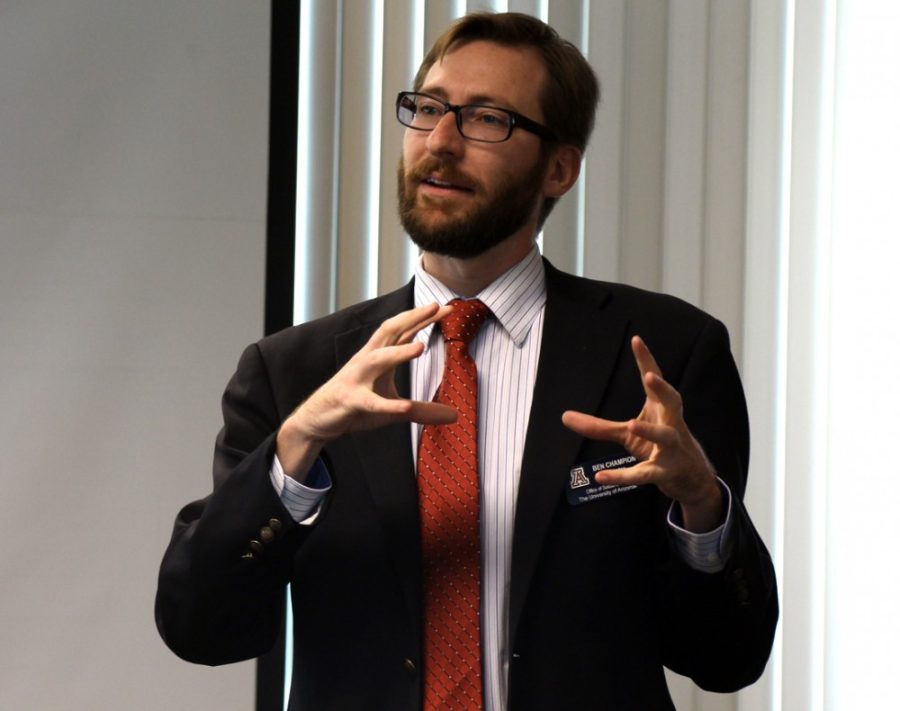UA students, employees and affiliates showcased their campus sustainability projects, which they had presented at a sustainability conference in October, to the UA community Monday morning at the Sustainable UA Initiatives Share-A-Thon.
Renee Guerin, a global studies senior and project manager of the Green Purchasing project, explained the concept as “Buy Less, Buy Better,” which is saving money by buying a smaller quantity of more sustainable supplies.
Not many people at the UA knew about the green purchasing policy, so the project was created to start a conversation with purchasers from Residence Life about the policy and what can be done to increase sustainability at the UA.
Emily Rose, a student studying environmental sciences and public health and an intern for the Waste Reduction committee of Students for Sustainability, said the Greeks Think Green committee was started during the fall 2012 semester by a Students for Sustainability intern and fraternity member who thought it was a good idea to promote recycling and composting in the greek chapters on campus. The committee’s formation and continuation was made possible by the UA Compost Cats and UA Green Fund.
“Greek Life is such a large part of the university,” Rose said. “It’s over 15 percent of the entire population, making it the largest student organization on campus.”
Rose said the committee sends emails to each chapter with an overview of the programs and asks if it wants to get involved. If the chapter agrees to join Greeks Think Green, it gets recycling and composting bins for its house with the proper signage. Greeks Think Green also provides coaching to all the chapter members so they know how to properly recycle and compost.
Currently, there are three chapters involved with Greeks Think Green: the Delta Delta Delta and Kappa Kappa Gamma sororities and Pi Kappa Alpha fraternity.
Andrew Falwell, a chemical engineering senior and undergraduate program director for Students for Sustainability, talked about a project focused on innovative water collection and filtration from the Highland Avenue Parking Garage. Falwell said Tucson is a good candidate for innovative water collection because of the monsoon season and consistent rain throughout the year.
The Green Fund provided funding for a new cistern to hold collected water from the Highland Avenue Parking Garage, Falwell said, which should be in place by the end of this year. Students for Sustainability wants to water the UA community garden with the water collected from three cisterns, as the group has applied for a second grant to fund two additional cisterns.
“All three cisterns will eliminate or nearly eliminate the irrigation budget for the community garden,” said Chester Phillips, Associated Students of the University of Arizona sustainability program coordinator. “… The excess would go to the landscaped area next to it. The garden’s single largest budget that it needs to support each year is its irrigation budget.”
Madeline Ryder, a senior studying natural resources and environmental studies and a member of Compost Cats, said the Compost Cats program was started in 2010 by students who requested and received a grant from the Green Fund. She said the city of Tucson and the UA signed an intergovernmental agreement in 2014.
“The city of Tucson will take over our pickup service and work on expanding it to city and commercial composting,” Ryder said, “and in return, the UA will focus more on the composting process itself and education throughout the community.”
The Compost Cats are actively involved in the composting of food that is collected from the UA at the San Xavier Co-op Farm, where the compost is then sprinkled into the gardens. The San Xavier Co-op Farm is a certified naturally grown farm.
“We don’t use any pesticides, herbicides or fertilizers of the sort,” said Cie’na Schlaefli, propagation manager for San Xavier Cooperative Association and Farm.
Todd Millay, assistant director for the Arizona Student Unions, said there are compost bins in Sabor, Pangea, Cactus Grill and the Cellar Bistro, but that people don’t see the work Compost Cats is doing with the student unions in addition to the compost bins.
“I think what we showed is that the University of Arizona is really at the forefront of what sustainability looks like at universities around the country,” said Ben Champion, director of the Office of Sustainability at the UA.
_______________
Follow Brandi Walker on Twitter.









